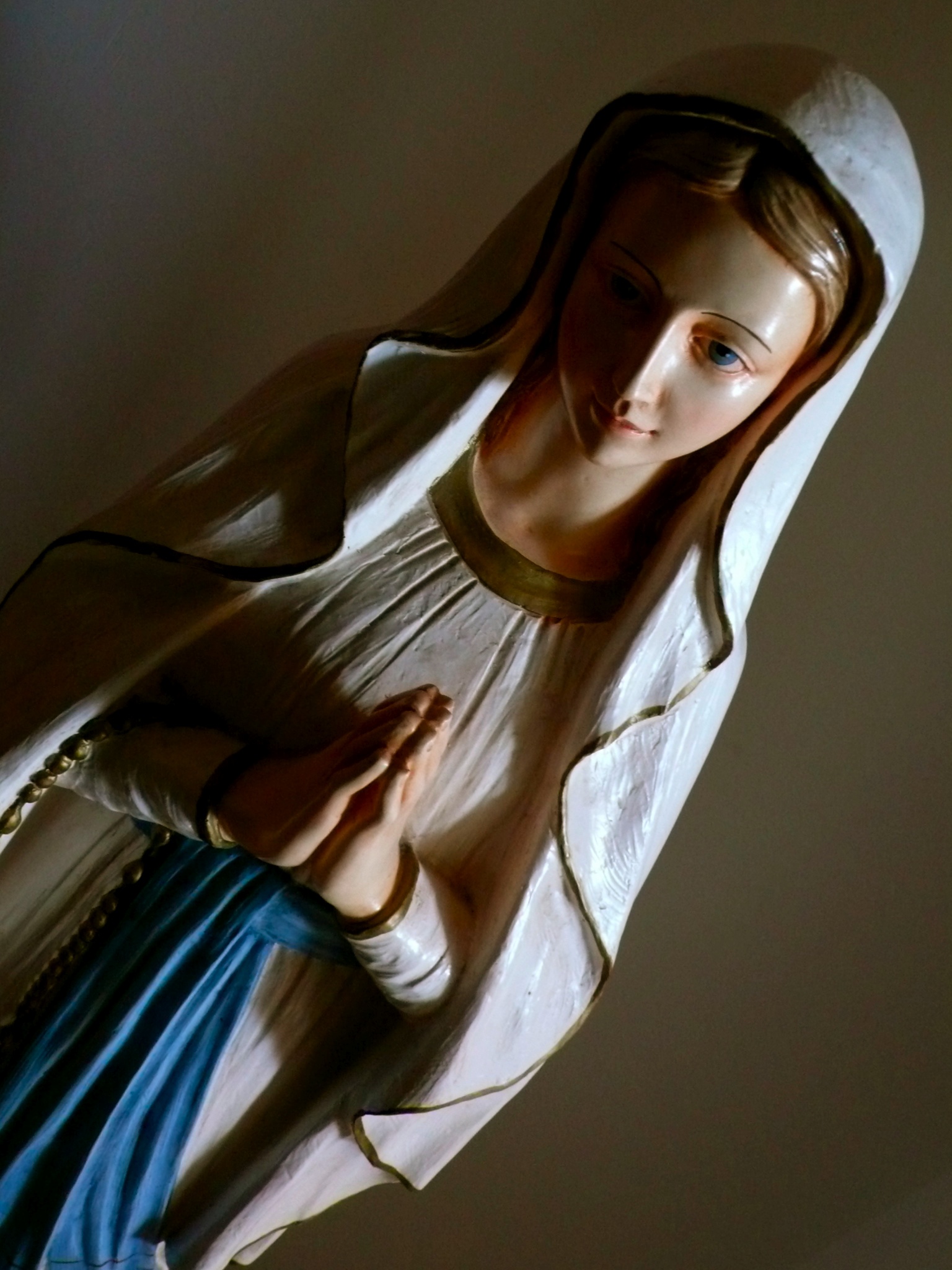My maternal grandmother, La Mama Anto’ gave light to a child nearly every three years or so. She repeated this pattern ten times. To give light to a child is a Sicilian expression meaning “to give birth”. By the time her tenth child was born, my grandmother’s eldest child was already married and had children of her own. The eldest of my grandmother’s ten children was named Rosa. She was lovely, hardworking, and had a cheerful disposition. We nieces and nephews lovingly called her La Pina Ro’.
Rosa passed away yesterday at the age of 101 years old. I imagine Rosa being welcomed into heaven by my mother and her other siblings who made the mad dash to heaven early on. As is the Sicilian custom, Rosa’s funeral and burial took place within twenty-four hours of her death.
I pray Rosa is resting peacefully after a long one hundred and one years of life on earth.

The great big Licata family. Rosa, the eldest of ten, is in the second row, second from the right.
I met La Pina Ro’ for the first time when I was ten years old, on my first trip to Grotte. She was recently widowed when I met her in Spring of 1972. She was clad in black from head to toe. Her daughter Pina, young and still living at home, was also dressed in black, black being the color of mourning.
My Nonna didn’t have a shower in her house. In order to bathe, I had to go down a steep ladder and into a musty-smelling damp wine cellar, where there was a large old-fashioned wash basin that my mother would fill with a mixture of boiled hot water and cold tap water for my much-dreaded bath. Water was precious so my mother filled the wash basin with about five inches of water and I had to climb in and get clean. I was ten, but, under the circumstances, my mother had to help me bathe. As my mom washed me, I stared at Papà Vivi’s suit that hung in the cellar right next to the tub: dark gray trousers, white shirt mottled by the passing of time, and a black vest. I was very frightened of the hanging suit. My grandfather had already been dead many years by 1972 and there was his suit hanging in the basement cellar. Thankfully, my mother bathed me, for I would not want to be alone in that cellar for a single moment.
La Pina Ro’ made my life much easier by offering to have me come over to her house for my showers and to wash my hair. Her house was not far down the medieval labyrinthine streets in the oldest section of Grotte, but she had a modern shower and a water heating unit that needed to be turned on about thirty minutes before the bathing ritual. She was quite proud of her shower and water heating unit. She even had a hair dryer for me to use.

Grotte’s labyrinthine medieval streets in the old section of the town.
Rosa invited me to spend the night with her, too. Her house was built out from one of the original grottoes the town is named after. Going back hundreds of years, perhaps to prehistory, the early inhabitants of Grotte lived in the grottoes. My aunt used her grotto as a wine cellar and for storage.

When I spent the night at her house, I slept with her. If my memory is correct, I remember we had to climb a steep ladder to get upstairs to her room. We snuggled in bed. It was April and there was a chill in the air, but the bed was warm and super comfortable. She had placed hot water bottles at my feet under the covers and I felt toasty warm. As we lie in bed, she asked me if I knew my prayers in Sicilian and I said, “No.” That night, our feet warmed by the hot water bottles, La Pina Ro’ patiently taught me to pray the Hail Mary in Sicilianu. Again and again, she had me repeat the prayer in the ancient language of my ancestors. Again and again, I prayed the words Rosa taught me until my eyes grew heavy and the prayer was deeply etched into my brain:
L’Avi Maria
Avi Maria, china di razzia
u Signuri esti cu Vui
Vui biniditta siti ntre fimmini
e binidittu esti u fruttu di vostru utru, Jesu.Santa Maria, Matri di Deu
priati pi nuatri piccatura
accamora e nta l’ura da nostra morti.Amin
She turned off the lights. The room was the darkest dark I had ever known. We were sealed in a cocoon of deep silence. As I was starting to drift into sleep, she asked me, “Fra, ti scanti?” “Fra, are you afraid?” She must have sensed that I was the kind of child who was afraid of my own shadow, certainly afraid of my deceased grandfather’s suit hanging in the cellar in my grandmother’s house, perhaps afraid of the depth of this Sicilian night. But on this dark night, deep in the heart of Grotte, I was not afraid. I had the warm loving comfort of my Pina Ro’ next to me, my Sicilian prayers memorized, and the protection of Mother Mary in my heart.

My lovely Zia at the entrance to her home

interior
Long before I met La Pina Ro’, I already knew so much about her. My mother always spoke of her with deep respect.
One story I have of Rosa is that when she was engaged to be married, the custom was that her fiance would spend evenings at her house in the company of her entire family. There was no television, so he would have to be creative and find a way to entertain the family. Apparently, my mother, who was just a child, became the source of entertainment for the whole family. She had a certain way of mispronouncing words, as many children do, so the family would say, “Pippina, what do you call a baby horse?” And my mother, who was just a little girl with a speech impediment that she would outgrow, was clever and she would avoid shouting out the word for pony, puddriddru, because it was hard to say and she knew she’d jumble up the word. Instead, she’d say cavaddru, the word for horse, because it was much easier to say. Everyone would howl with laughter because she was so funny.
Rosa started sewing at a very young age. When Rosa was twelve years old, she sewed a suit for her father. She created the pattern by herself and she cut the material. Furthermore, she sewed the entire suit by hand! Her father proudly wore his suit to Sunday mass and Rosa became the talk of the town. She became a sarta, a seamstress. In Rosa’s case, she was a child prodigy seamstress. People lined up at her parents’ house on Via Confine to have Rosa take their measurements. She’d hand-sew beautiful suits and dresses for her clients. She worked diligently and voluntarily gave all the money she made to her parents.
One day, Papà Vivi (her father, my grandfather) went to the neighboring town of Racalmuto to buy Rosa a sewing machine as a surprise. He carried it home on his back, all the way from Racalmuto to Via Confine.
Rosa was sewing when she saw her dad carrying the sewing machine into the house. He heard her whisper to herself, “Beddra fosse si fosse pi mia.”. A literal translation would be, “It would be beautiful if it were for me.” Suddenly her father walked right up to her and placed the sewing machine down and said, “Rosa, my first born, this is for you!” She began sewing for everyone in town.
Papà Vivi owned a sulfur mine. He rented it out and made sizable profits. When Rosa was 12 years old, he had a savings of 18,000 lire in a private bank. My cousin, one of Rosa’s sons, says that 18,000 lire might have a value of close to a million US dollars today. My grandfather was able to buy Rosa a house and all her furniture outright when she got married.
But back in 1929, something really bad was about to happen.
Back in America, Wall Street crashed. After the Wall Street Crash of 1929, the whole world spun into financial crisis. Banks were collapsing in America. Banks in Italy also failed at alarming rates and collapsed. Worldwide depression of the early 1930s hit Italy very hard in 1931.
The story of the Licata family’s lost wealth goes like this: a woman came to the Licata house on Via Confine to have her clothes made and she talked about a rumor she heard. She said, “Private banks will be going bankrupt!” Papà Vivi’s face went pale.
Papà Vivi went to the bank the next day to withdraw just 500 lire to see if the bank was indeed going bankrupt. He received his withdrawal of 500 lire without a problem.
My grandfather had no way of knowing that the banks were allowing their clients’ monetary withdrawals and proceeding as normal to avoid suspicions of the coming disaster. The banks knew they were in crisis mode. That night, my grandfather decided that talk of bankruptcy was simply not true. Three days later, he lost his entire fortune as his bank collapsed. When he thought he was completely alone, he broke down and cried. He was inconsolable. It was his darkest hour. He thought he was alone, but his wife and all his children witnessed his emotional breakdown.
Lagrime ‘mare. Bitter tears.
That is how Rosa described Papà Vivi ‘s tears. Rosa would never forget this day. She vowed to make herself stronger for the most precious person in her life, her father. She, the eldest of this large family, would not let her father crumble. She would see to it that her family would pull through.
My grandfather Vincenzo Licata (Papà Vivi):

Morning to night, Rosa sewed for her clients with an unwavering resolve. There was no field work for her. Instead, she sat at her sewing machine morning and night, sewing to help her family out of this financial disaster. She tried desperately to pull her father out of his deep depression. Life became incredibly difficult. Papà Vivi got very sick. And Rosa sewed and sewed, the whir of her sewing machine echoing throughout the house, the rhythmic sound of the fast moving machine spilling out onto the narrow cobblestone streets of Via Confine.
She pulled the family through the depression. And there is much more to her life. She was incredibly loving and raised her own family. She had deep faith in God and felt blessed to count among her children a son who became a priest. Her children, grandchildren, and great grandchildren are the loveliest family members ever. In her later years, she developed dementia and her children tended to her with the steadfast love and respect she earned.
REST IN PEACE
Rosa Licata
October 12, 1917 – November 22, 2018

Rosa Licata: Easter, 1988, in her beautiful pristine house
Below is an article from the local paper, celebrating Rosa Licata 100th year of life from last year. Translation in English follows.
Nonna Rosa compie 100 anni!
Gli auguri della comunità cittadinaL’Europa era in pieno Primo Conflitto Mondiale. La Russia viveva la drammatica Rivoluzione d’Ottobre. Tra i tragici eventi che funestavano quel periodo, in una abitazione di Grotte si verificava un lieto evento: nella famiglia Licata veniva alla luce una bambina, cui era dato il nome di Rosa. Era il 12 ottobre 1917 Sopravvivrà a quel conflitto e vedrà, da signorina, le vicende dell’altro confitto ancor più drammatico, la Seconda Guerra Mondiale. Ed in tutte le difficoltà che la vita le presenterà, Rosa Licata troverà i1 modo di farsi coraggio, accudire e far crescere i propri cari con quell’amore che solo una donna forte e tenera sa dare. Oggi al superamento della soglia dei 100 anni – un secolo di vita -, accanto alla signora Rosa vi sono i suoi figli e nipoti a festeggiarla con il classico augurio “Buon compleanno!”: “Nata a Grotte nel lontano 1917 Licata Rosa, nota ai più come la za Rusidda”, compie oggi i suoi 100 anni! Donna di profonda fede cattolica, l’unico “peccato” è che sia arrivata a questa veneranda età segnata dalla balorda malattia senile, ma amorosamente assistita e circondata dai figli Don Vincenzo, Giovanni e Pina, che ne rendono omaggio insieme a tutti i nipoti e pronipoti . Tutta la comunità cittadina si stringe attorno alla signora Rosa per augurarle tante altre candeline da spegnere. Gli auguri dell’Amministrazione: “Cent’anni fa nasceva una donna speciale: la Sig.ra Rosa Licata alla quale il sindaco Paolino Fantauzzo, la presidente del consiglio comunale Rosellina Marchetta, gli assessori e consiglieri tutti, formulano tantissimi auguri”. -Carmelo Arnone 12 ottobre 2017
Translation of the above written last year on Rosa’s 100th birthday:
Grandmother Rosa is 100 years old! Congratulations from the community of Grotte.
Europe was in the thick of World War I. Russia was living out the dramatic October Revolution (also known as The Great October Socialist Revolution). Among the tragic events that were unfolding, a happy event was taking place in a house in Grotte: a baby girl was born to the Licata family. They named her Rosa. It was October 12, 1917. She would survive these conflicts and she would live to experience, in her youth, the coming of yet another more dramatic conflict, the Second World War. And in all the difficulties that life would present, Rosa Licata would find a way to become courageous, to look after and raise her own dear family with the kind of love that only a tender and strong woman knows how to give. Today on her reaching 100 years of age, a century of life, her children, grandchildren, and great grandchildren are with her to celebrate with the classic congratulatory “Happy Birthday!” “Born in Grotte in the far off year of 1917, Licata Rosa, more popularly known as “za Rusidda”, became 100 years old today! A woman of deep Catholic faith, the only “sin” that she may have ever committed at this venerable age, is to have fallen victim to dementia. She is lovingly assisted and surrounded by her children, Don Vincenzo (Father Vincenzo), Giovanni and Pina, whom with her grandchildren and great grandchildren, bestow great honor to her.” The entire community of citizens (of Grotte) gather closely around la signora Rosa to wish her the occasion of many more brightly lit birthday candles. The Administration’s congratulatory wishes are: “One hundred years ago, a special woman was born: Mrs. Rosa Licata, to whom the mayor Paolino Fantauzzo, the President of the Community Counsel Rosellina Marchetta, and all the community assessors and counselors send their best wishes”.

Grotte, Sicily







Very touching, it recreated parts of my childhood , I was named after zia rosa as both my grandmothers
We’re named antonia , so next in line would be the eldest sister…
She truly was the kindest and modest lady you could ever meet.
Thank you fran
Love Rosetta x
Thank you dear cousin Rosetta! How we loved her! You are so lucky to carry her name. (Like you, I carry my father’s eldest sister’s name). Pigliasti assa di la Pina Ro’, buon’arma. Love you, Fran
Your Aunt Rosa is indeed smiling at this delightfully detailed depiction of her life and prompts great admiration!
& Fran, Belated Best wishes for birthday blessings and bliss🎂
Beautiful Fran. Your aunt (and history) so lovingly captured.
A life well lived…no matter the circumstances.
Namaste,
Linda
and Steve
I spoke to Pina Ro’s sons and daughter-in-law today. Padre Vincenzo (her middle son) read the blog and was moved by it! He told me something I didn’t know: Everyone related to Padre Vincenzo from his maternal side of the family (including me), called his mother, La Pina Ro’. Everyone related to Padre Vincenzo from his paternal line called her Pina Rusi. And her father, Papa Vici called her Russidra, which means Little Rose in Sicilian. I have never seen her marriage photo so my cousin explained that when La Pina Ro’ got married, the custom of wearing a white wedding dress was unheard of in Sicilian custom. The bride wore somber colors, like gray for a dress and a black cape over her dress. And in Pina Ro’s day, no one took photos of the bride and groom. It was thought to not be good luck. So newlyweds had their photo taken on the 8th day of their marriage. The photo was called “lu ritratu di ottu iorni” or “the photo of eight days”. If I get a copy of the photo, I will add it to a blog post and talk about the Sicilian weddings back in her day.
This is so beautiful Fran. The fabric of your family is so rich. Thanks so much for sharing. Xo.
Fran,
Thank you for sharing the special story of your aunt. It was very touching and an example for all of us!
This is so beautiful Fran! You have such a wonderful family and your au was an amazing woman.
So sorry for your loss. This history is so touching and powerful.
Hi Gwen, I got both your replies. I know sometimes it’s hard to know if your comment went through and then not sure if I am getting them. I get all the comments every time. Thank you for your kinds words. This entry took hours to write. I had to get it just right. My aunty deserved the honor of what I wrote about. Love, Fran
Fran I am so sorry for your loss. What an amazing history you write about and have close knowledge of.
Beautifully written, Fran — what an amazing woman. I hope you have a wonderful birthday celebration and can also live to be 101!!
Thanks for sharing your beautiful memories, Fran. Aren’t we so lucky to have extended family who love us so! May she Rest In Peace.
This was a moving tribute to your Aunt Rosa. If my memory serves me….your birthday is around this time. If so, I wish you or belated Happy Birthday!
Fondly,
Keiko
Thank you, Keiko. Yes, my birthday is tomorrow. And I think you have one close to mine! Hope you are well. Thank you for being one of my readers. I appreciate you! love and namaste, Fran
What an amazing woman. I’m so sorry for your loss.
love, Kay
What a beautiful tribute to La Pina Ro!
Thank you!